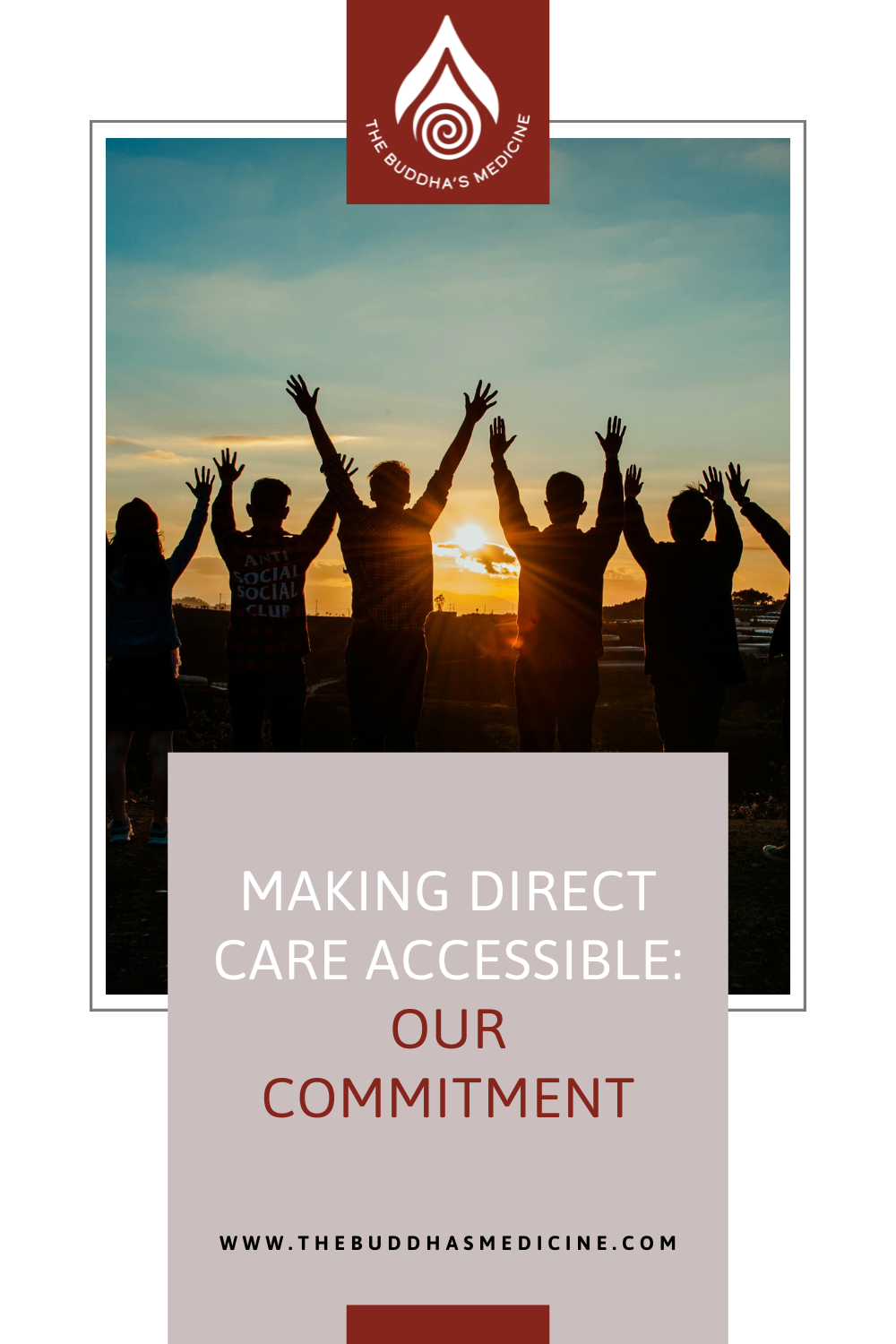Making Direct Care Accessible: Our Commitment
This post is Part 3 of a 3-part series. If you haven't already, please check out Part 1 & Part 2!
So, now that we've looked at some of the shortcomings of the modern American healthcare system from the insurance/financial side - and subsequently discussed one care option we can choose to lean into instead - we'll discuss what direct care means practically at The Buddha's Medicine.
Flexible Financial Options
Financial flexibility and accessibility is essential in this day and age, particularly considering the rising cost of living. We know from first-hand experience that this is the shared reality we live in.
So... how do we make space for our patients to invest in their own healthcare flexibly?
Well, while we've previously written about this separately, it is valuable to recap some aspects of our commitment to that flexibility here, too
Free consultations - each and every potential patient of the practice is entitled to a 15-minute consultation with me, entirely free of charge. Jamie offers the same courtesy with respect to her therapy services, as well. This is an opportunity to meet one (or both) of us based upon your care needs, share a bit about yourself, and ask us any questions you might have - including regarding the investment in your own health.
Payment plans - we offer these as an optional courtesy to all of our patients, whether new or established. These are zero interest plans; they are, instead, good-faith payment options that provide broader access to the work we do.
HSA/FSA utilization - our medical and mental health services are covered by HSA/FSA funds, and we encourage our patients to use them when they are available. This is an excellent option for those with that benefit, as it saves even more financially after making the switch to the investment in direct care.
Superbills - these are also a courtesy we can offer our patients with private health plans. Superbills can sometimes get our patients out-of-network reimbursement. There is no guarantee that any one patient will get money back from their insurance plan, but each and every superbill does count towards deductibles, and every little bit helps.
Ongoing Development and Quality Improvement
We are always working on developing and growing new aspects of our practice to increase both accessibility and value.
As I write this post (11/2025), there are a few fun projects we have in active development:
Preventive and seasonal health group programs, with hybrid live and recorded medical content and lifestyle coaching support. These will be available nation-wide.
Group mental health, somatic, and nature therapy offerings for our community in Oregon and Washington state.
A practice membership option - inspired by direct primary care - with further enhanced access to medical care, exclusive urgent care services, reduced rates for services (medical, mental health, massage, lifestyle coaching), and more. This will be available nation-wide.
The True Value Proposition
An accurate side-by-side cost comparison of available care options is really difficult to fully hash-out on paper. This is because there are so many variables - especially the unplanned costs that come with being a patient in the modern American healthcare system. Instances of non-coverage and under-coverage are common and usually can't be predicted, and variables like age and chronic conditions dramatically influence what each person pays out of pocket for their care.
Some estimates suggest that Americans right now (late 2025, as we're just about to enter a full-blown crisis) spend an average of $7,500 per person on medical care per year. Of course, for individual people in good health, that may be several thousands of dollars lower per year. On the other hand, for those with ongoing/chronic medical conditions needing treatment and/or without financial support, that amount might be tens of thousands of dollars higher. It very much depends on the circumstances, and costs are going up dramatically right now - sometimes by 75% per person or more, as we looked at in Part 1.
But those yearly costs don't reflect the quality of care and connection a person gets in return. They simply reflect access to some form of care, no matter what that is. Most commonly, that's the American variety of allopathic care that is predominant in this part of the world. And that's very valuable at times, particularly when surgery and/or emergency care is called for. Much of the time, though, allopathic care alone largely amounts to suppressing symptoms and medical conditions without addressing the underlying causes of disease. This leads to slow but steady disease progression, and gradually increasing costs for the individual.
That said, we can contrast that kind of care with the value provided through our model.
Let's assume that a person sees me for a comprehensive new patient visit, 4-5 follow-up appointments in the 12 months after the new patient visit, and a lifestyle coaching appointment to support their plan of care.
They get an extremely thorough initial plan of care during their first visit.
This includes personalized nutrition, movement/exercise, and lifestyle recommendations;
Medicinal breathwork;
Mind/body medicine interventions;
Ayurvedic acupressure practices to use at home;
Complete medication and supplement review;
And thoughtful guidance regarding any further diagnostic testing (labs and/or imaging and/or other studies) that might be necessary, selected only if fully appropriate.
After all of that, I then hand-select herbal medicines, personally designing and blending the majority of them.
They have constant access to me throughout their process via our patient portal to ask questions, provide updates on how they are doing, and more.
Detailed journaling tools are provided as a courtesy.
Recipes and detailed instructions for all recommendations are given.
We put together a fully individualized follow-up plan.
Lifestyle coaching is available as an additional supportive service when helpful.
There is frequent availability for same-day short appointments as needed if issues arise. I provide answers regarding urgent health concerns, can support prescription needs or take over prescribing various medications (if needed), and more.
This integrative model helps to eliminate redundant appointments. It also helps to lower expenses by reducing unnecessary or superfluous diagnostics, and it reduces urgent care and emergency room utilization (including the expenses that go with those services).
There is a quality and depth of relationship with the physician (that's me) that each person gets in seeking care at The Buddha's Medicine - and that can be hard to find elsewhere.
All of this together is available for an average of $2,000-$2,500 for the first 12 months.
And as time goes on and folks find their health improving, we reduce appointment frequency further, and are also able to reduce the number of interventions we need over time, and this saves folks more money and brings out the most value possible.
Success Stories: Patients Who Made the Switch
We know that it's valuable to get a sense of how the investments we make play yield benefit. So let's look at just two examples of real, anonymized patients who made the switch to receiving care with us. These, of course, have been scrubbed of any possible identifying information to protect their legally-protected healthy and medical confidentiality.
1) Consider one patient of ours who was dismissed as someone who would always need to be on thyroid medication for Hashimoto's thyroiditis - a low thyroid autoimmune issue. They were not satisfied with that. Nor could they figure out how to correct for their chronic constipation and bloating. At the same time, they were struggling with significant nighttime hot flashes and high cholesterol.
This person had spent a lot of time and money with various healthcare providers (MD primary care providers and specialists, naturopaths) and on their own trying to figure these things out by the time they found us. But it only took us a couple of weeks to get their digestive system into a rhythm, and a few months to get their thyroid function normalized and to get the autoimmune condition into remission. Their hot flashes are now dramatically improved, and their cholesterol numbers are trending down. They never needed to go on pharmaceutical medications for these issues. They have access to me whenever they need, and they are feeling cared for and healthier.
Just as importantly, they have saved themselves time, and (they estimate) a few thousand dollars so far on a kind care that would not have helped them, investing less in care that has helped them.
2) Or consider another patient of ours with inflammatory bowel disease - an autoimmune gut condition - and their story. They are on chronic steroids to keep the condition suppressed. They have had many providers (MD primary care providers and specialists, naturopaths) tell them that they need to have their colon taken out, in spite of the fact that their condition is controlled, and they really, really don't want to undergo a permanent surgical procedure that would leave them without a colon. They also have struggled with chronic shoulder and neck pain, wrestled with chronic emotional stress and anxiety, as well as Graves' disease (an autoimmune over-active thyroid condition).
This individual has actually chosen to see us more often than the usual cadence for care, because they are getting so much value out of our care. And several months in, they have already saved money and stress on conventional office visits and interventions, because their bowel function and abdominal discomfort are improving. They are ready to begin a slow taper of their prednisone, with me guiding that process. Their neck and shoulder issues are resolved. They've also begun safely exploring the underlying elements of their emotional stress patterns with myself and with Jamie.
This person has found great benefit in seeking both medical and mental healthcare with us. They have reduced their frustration levels, and will be saving thousands of dollars over the course of the next few years in avoiding major surgery and any complications that might follow that.
Addressing Common Concerns and Questions
There can and should still be questions that you have if you're considering in pursuing care with us. We can't possibly predict all of them here, though we've curated a list of some important ones below. We are also happy to respond to these and any others you might have during a completely free-of-cost 15-minute consultation before you make any decisions.
"What if I have a medical emergency?"
Part of our role as a medical practice is to provide sound guidance relating to medical emergencies and possible medical emergencies.
So the answer to this question very much depends on the specific emergency. For something catastrophic or potentially catastrophic, we will always direct you towards the appropriate resource - most likely, 9-1-1 emergency services and a local emergency room.
If the issue at hand does not rise to that level - and we can help you determine that - then there's much more that we can do directly. What we do may include guidance over the phone or via secure messages over our practice portal; or it may involve an urgent care-type same-day appointment with us; or it may involve more.
If your interest is leaning into direct care more fully, then we might also encourage you to consider a high-deductible care plan with an emphasis on emergency care coverage that lowers your up-front out-of-pocket costs while still keeping you protected from a possible emergency room bill.
"Can I really afford this without insurance?"
The answer to this will always depend on your particular needs, finances, and budget.
That said - as I hope we have shown - we actually save our patients money in many instances via access, quality of care, and reducing the use of conventional medical services (which saves money by avoiding instances of non-coverage, copays, and more).
"Will my insurance reimburse anything?"
That is possible, though we can't (and don't) make any promises on that front. We do offer superbills for our patients with private plans, and a superbill will virtually always count towards a yearly deductible.
Sometimes, insurance companies will reimburse part or all of what is cited on a superbill. This only occurs in a minority of cases in our experience, though. Reimbursement is more likely to happen with high-end plans and when our patients are willing to advocate for themselves with their insurance carrier.
Conclusion: A Call to Reimagine Healthcare
We cannot simply wait around and hope that our politicians who take millions of dollars in lobbying money from insurance companies to suddenly give those dollars back and work for us. We cannot wait for them to change the system so that it works in the favor of patients; of everyday people.
What we can do is change the way we as patients and care providers interface with each other.
The Opportunity in the Crisis
As with any crisis, there is opportunity for us to find if we get creative. And this situation definitely calls for us to get creative.
The dramatically and suddenly rising costs of care are forcing this conversation to be had more openly than before, and that is a silver lining.
One way we can make lemonade out of this moment is to return to relationship-based, direct exchange medicine. We get to vote with how we use our wallets and with where we choose to bring our needs.
Let's do just that.
Who This Model Serves Best
The cheap and easy answer is: a whole lot of folks! But not everyone.
Is direct care right for you? Only you can answer that question definitively for yourself. One way to begin exploring that is to ask yourself additional questions about your healthcare needs and your values.
We know that medical misfits of any kind benefit greatly, for example. So do people in good health who want something more than conventional standard from their care. But many others benefit, too.
If you're curious and want to pose some of these questions to us directly, you can do so with me completely free here, and with Jamie here.
The Ripple Effect of Choosing Differently
Each and every one of us who chooses to interface with medicine and medical care differently can and does contribute to shifting the healthcare landscape just a bit.
That benefits our loved ones and neighbors by example - and by shifting the economy, as dollars circulate in local communities and economies; the same dollars that large corporate entities (with a fiduciary responsibility to deliver for their shareholders) so badly want to hoard more of.
When we support models of care that prioritize healing over profit, we encourage and facilitate more healing among ourselves.
Every revolution begins with small acts of resistance; the healthcare revolution will be no different.
We know that direct care won't be the right fit for everyone. Those it works for, though, will find that their experience of healthcare becomes a cost-saving and healing partnership rather than a cold transaction. For our part, we will always be committed to making our care as accessible to our patients as we possibly can.
And once more: you are invited to discuss your individual care and needs with us for free. Be in touch with me directly here, and talk with Jamie here. We look forward to hearing from you soon!
And as always, Dr. Matt is available to discuss the ins-and-outs for you! If you are curious about your constitution & health (or health of a loved one), you can book a cost-free, 15min Consultation, and we’ll discuss!
Professional disclaimer: please do not initiate any herbal or other medicinal interventions without the guidance of a knowledgeable provider.
Dr. Matt Van Auken, MD, MPH
Dr. Matt is an Ayurveda-trained, triple board-certified physician.








